Describing Jools and Lynda
“On paper, they should not work”
We’d like to present one of the newest collections at the Alexander Turnbull Library, the Diva Productions Ltd: Records of the Topp Twins (MS-Group-2258).
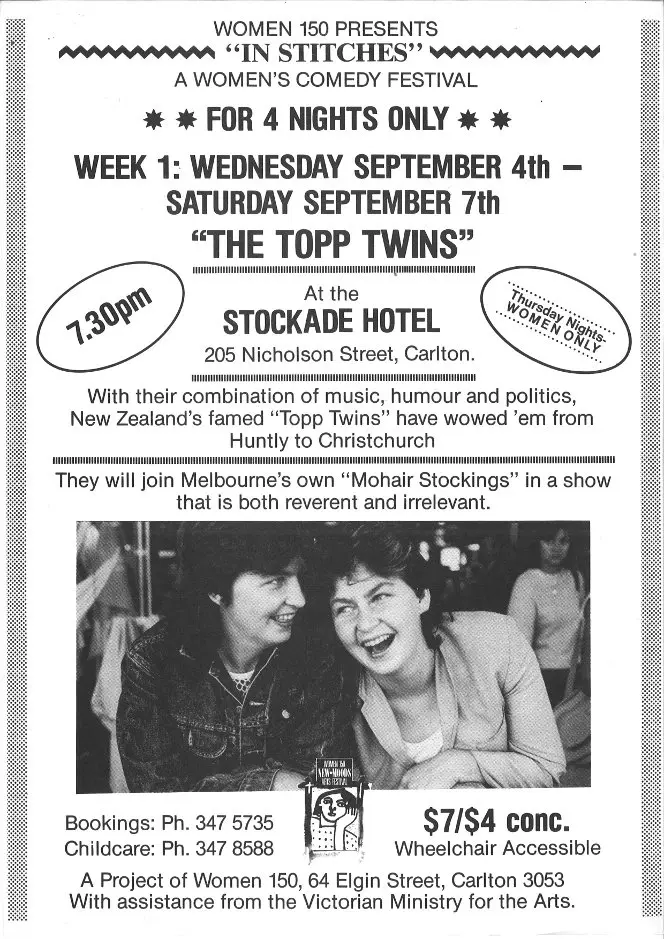
From the folder of flyers added to the collections. Ref: MS-Papers-11685-40.
Identical twins Jools and Lynda Topp have performed as a comedic country music duo since their early days as buskers in Christchurch and Auckland in the early 1980s. The Topp Twins were also actively engaged in most of the major social justice movements in New Zealand during that time. Thirty years later, they’re still performing both on stage and on television.
As fellow comedy writer Paul Horan has said:
“Yodeling lesbian twins... on paper, they should not work. On paper, they should be commercial death. But they totally deliver to the audience, time and time again.”
The collection of Topp Twins materials was donated to the Turnbull Library by Diva Productions, their artist management company. The records document the Topp Twins’ career as performers, and include newspaper clippings, press releases, publicity materials, tour schedules, and posters from their concert tours around New Zealand and internationally.
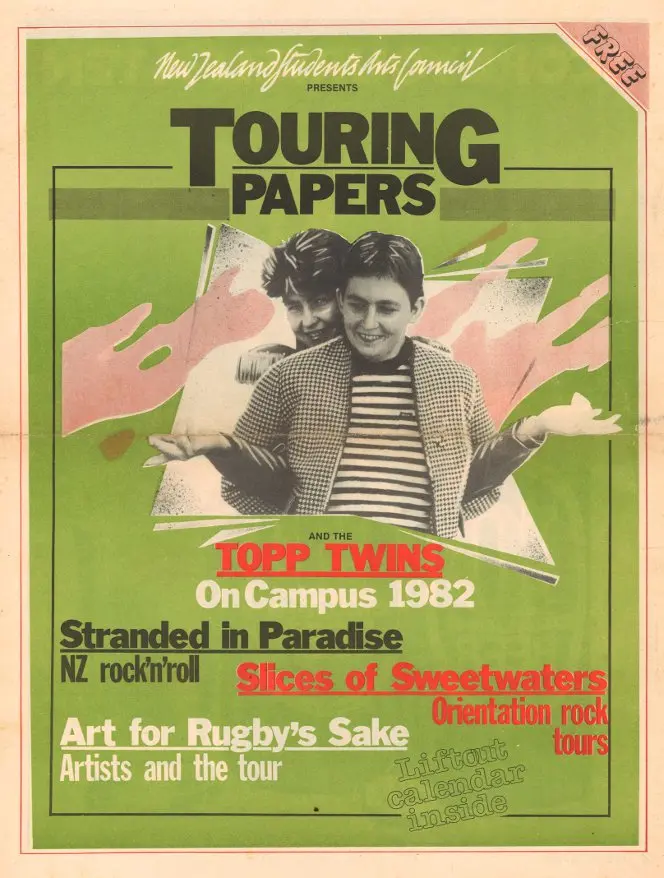
From the folder of newspaper clippings. Ref: MS-Papers-11685-10.
The collection also includes materials from the Topp Twins television series, which aired for three seasons from 1996-2000. The television series records include episode scripts, shooting locations, and hair and make-up requirements for Jools, Lynda, and other cast members.
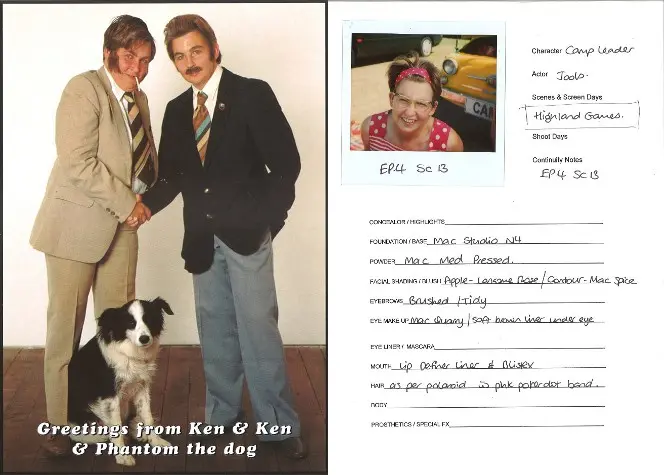
Publicity postcards featuring Jools and Lynda Topp as ‘Ken and Ken’. Ref: MS-Papers-11685-180; Camp Leader hair and makeup continuity sheet for Highland Games episode, Topp Twins series 3. Ref: MS-Papers-11685-165.
Making it all findable
As a Research Librarian on the Arrangement and Description team at Turnbull Library, my role is to create finding aids and records for incoming unpublished collections at the Alexander Turnbull Library, and to prepare collections for researchers to use.
Finding aids are descriptive records created by the Library to help researchers discover and navigate through unpublished, archival materials. Since 1991, the Library has created and published finding aids through a bespoke computer system known as TAPUHI – originally Turnbull’s Automated Project for Unpublished Heritage Items – which is also a Māori word meaning ‘to nurture’.
These finding aids – which cover manuscript, photographic, drawings paintings and prints, oral history and sound collections, maps, and ephemera, and more – present collection information in a structured, interlinked hierarchy. The Turnbull’s finding aids also contain links to relevant names, subjects, and places for the collection or item, so researchers can easily find materials and browse other collections on a particular topic.
For collections that comprise multiple items, we create a collection level record – also referred to as a ‘group’ or ‘parent’ record, which provides an overview of the content and provenance of the collection as a whole. For the Diva Productions records, which comprise mostly manuscript materials, this collection level record has the reference number MS-Group-2258.
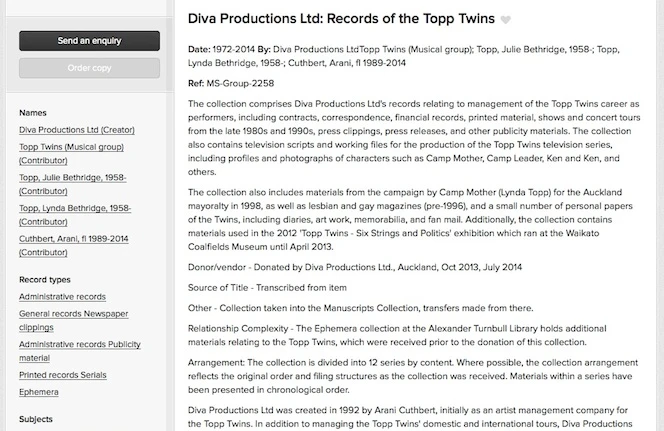
Collection record for Diva Productions Ltd: Records of the Topp Twins. Ref: MS-Group-2258.
The collection record explains the structure and the arrangement of the collection, and links to items in the collection, also known as ‘child’ records. Depending on the size and significance of the collection, the child records may describe a box, a folder of materials, or individual items.
Large collections may also be divided into series, where like items are intellectually grouped together. For the Topp Twins papers, I arranged the collection into 12 series by content, including personal documents, press clippings, concert tours and publicity materials, business records, television shows, and more.
Each series record contains a description of the contents of the series, as well as links to the individual child records in that series.
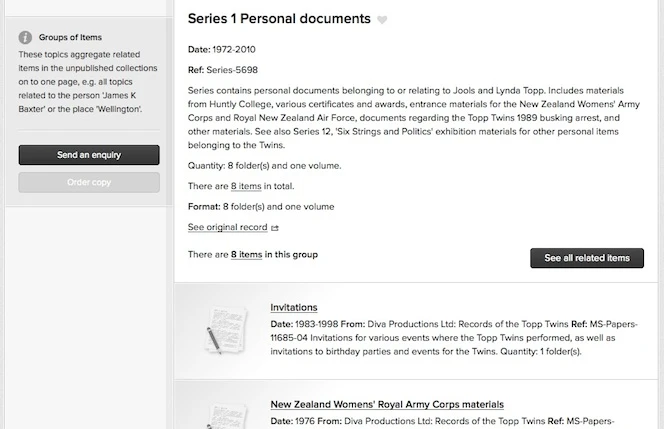
Series record for Series 1 – Personal Documents. Ref: Series-5698.
Unlike collection and series records, which describe groups of materials, item records – such as the one below for a folder of materials regarding the Women’s Royal Army Corps – can be requested for viewing in the reading rooms.
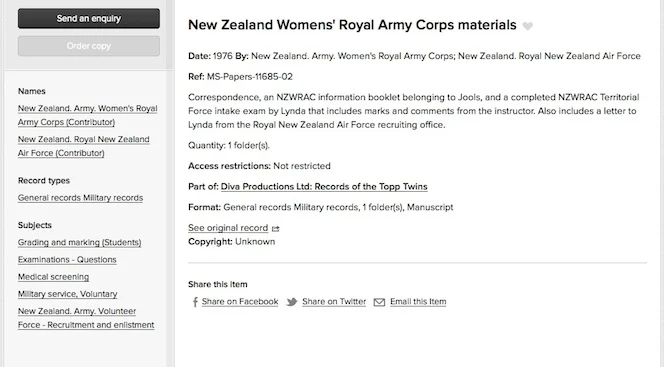
Item record for New Zealand Womens' Royal Army Corps materials, from Series 1. Ref: MS-Papers-11685-02.
Finding aids help researchers to understand exactly what a collection comprises so they can determine if a particular box or folder might contain the information they’re looking for before they request to view the items in person. Finding aids also provide information about access and use of unpublished materials, including any restrictions that a collection or item may have, and allow researchers to request items for viewing in the Library’s reading rooms.
For small collections, creating finding aids can be a relatively quick process. But for larger collections like the Diva Productions records, the arrangement and description and behind-the-scenes work to prepare a collection for use by researchers may take weeks or even months. My work to arrange and describe the four linear metres of Diva Productions records entailed the creation of over 200 individual item records on TAPUHI in order to represent each individual folder of materials in the collection.
By describing the collection to this level of detail, we aim to provide a richer analysis of individual items and make it easier for researchers to understand exactly what a particular unpublished collection contains.
“Very clever! But no marks”
While the Diva Productions collection is mainly made up of publicity items and other materials from Topp Twins’ career as performers, there are also a few personal items in the collection, which provide greater insight into the Twins as individuals before they came into the limelight.
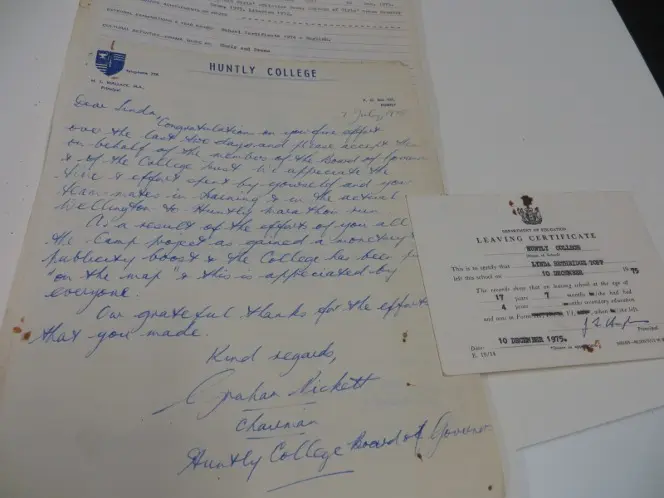
Huntly College letters and leaving certificates. Photograph by Valerie Love. Ref: MS-Papers-11685-01.
While at Huntly College, Lynda served as captain of the girls’ athletic team and girls’ cross country team. In the letter above dated 7 July 1975, the Huntly College chairman of the Board of Governors commends Lynda on her teamwork and training efforts.
"Dear Linda,
Congratulations on your fine effort over the last two days and please accept them on behalf of the members of the Board of Governors of the College Trust. We appreciate the time and effort spent by yourself and your team-mates in training and in the actual Wellington to Huntly marathon run.
As a result of the efforts of you all the Camp project has gained a monetary and publicity boost and the College has been put “on the map”. And this is appreciated by everyone.
Our grateful thanks for the efforts that you made.
Kind regards,
Graham Pickett Chairman,
Huntly College Board of Governors"
A scrapbook containing photographs of both Lynda and Jools and event programmes from competitions further demonstrates the twins’ strong athletics background.
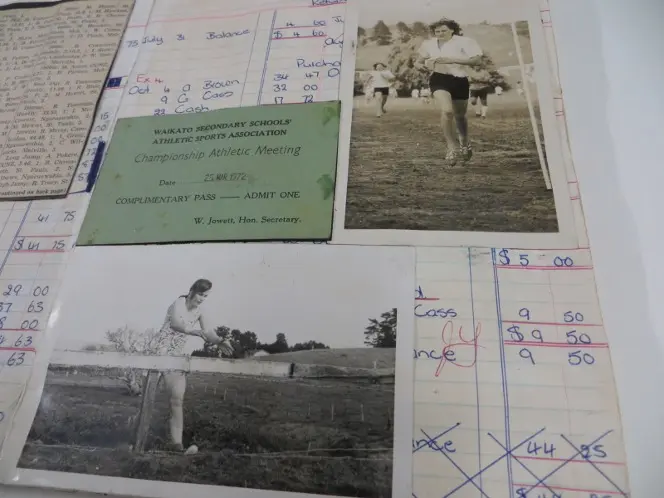
Athletics scrapbook, ca. 1972-1975. Photograph by Valerie Love. Ref: MSY-8104.
After moving on from Huntly College, Lynda Topp’s penchant for comedy comes through in this page from her New Zealand Women’s Royal Army Corps Territorial Force intake exam from 1976, in which the instructor notes that her answer to question 7b is ‘very clever! but no marks’.
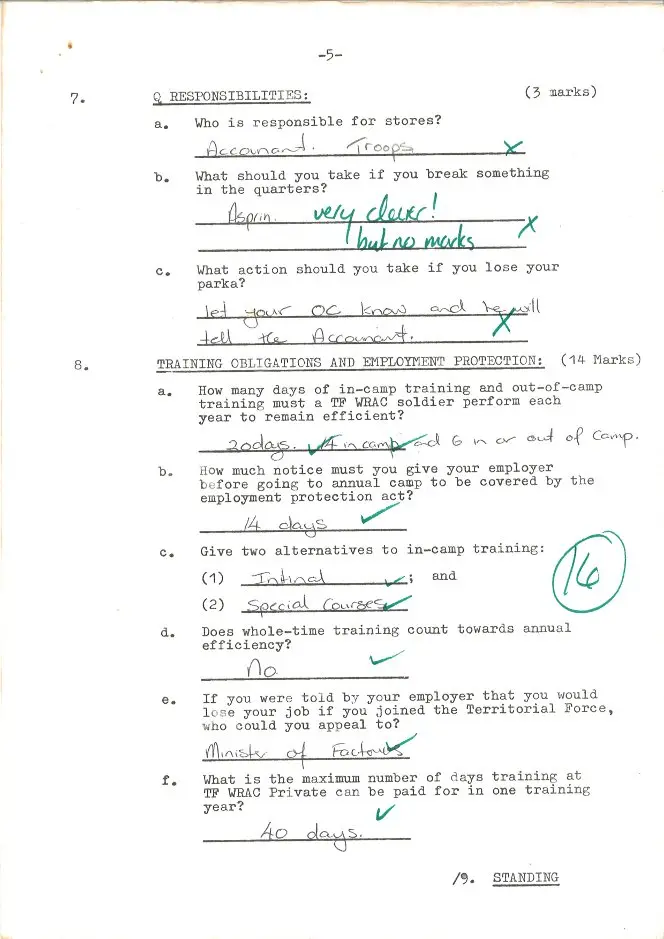
New Zealand Women’s Royal Army Corps Territorial Force intake exam. Ref: MS-Papers-11685-02.
Find the finding aids
I love being able to dive into collections, to discover new insights, and to learn more about the people, places, and events that these primary materials provide a lens into. By the time I finished writing the finding aid for the collection, I felt like Lynda, Jools and I were old friends.
But the satisfaction that comes with completing the finding aid for a collection – and having researchers begin to use it – is probably what I love most about my work here at Turnbull Library.
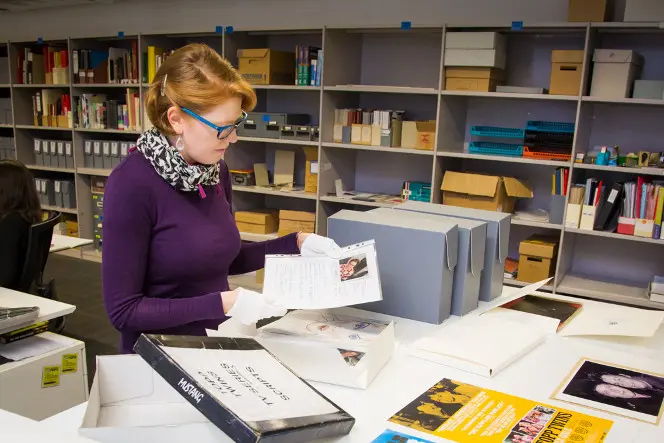
Valerie works on processing the Diva Productions Ltd: Records of the Topp Twins collection. Photo by Llewelyn Jones.
The finding aids for the Diva Productions Ltd: Records of the Topp Twins collection are available now:
The collection is available to researchers in the Katherine Mansfield Reading Room. Please contact our friendly Research Enquiries staff for more information, or to access the collections.
Thanks for the blog post.Really looking forward to read more. Want more.